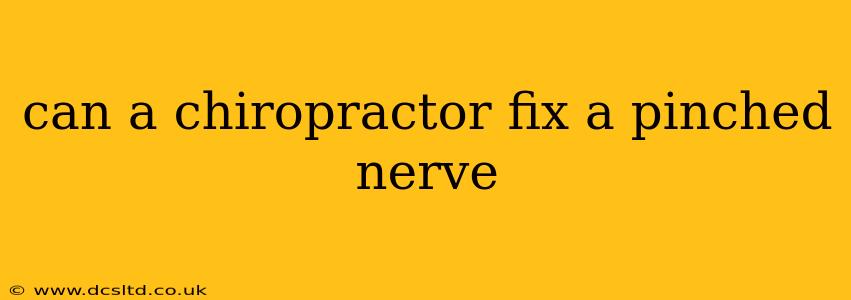A pinched nerve, also known as a compressed nerve, occurs when surrounding tissues, such as bones, cartilage, muscles, or tendons, put pressure on a nerve. This pressure can cause pain, numbness, tingling, weakness, or other symptoms depending on the location of the pinched nerve. Many people wonder if a chiropractor can help alleviate these symptoms. The answer is nuanced and depends on several factors.
While chiropractors don't "fix" a pinched nerve in the sense of surgically repairing damaged tissue, they can often effectively treat the symptoms and improve the underlying conditions contributing to nerve compression. Their approach focuses on restoring proper spinal alignment and reducing pressure on the affected nerve.
How Chiropractors Treat Pinched Nerves
Chiropractic treatment for pinched nerves typically involves a combination of techniques, tailored to the individual's specific needs and the location of the pinched nerve. These may include:
-
Spinal Manipulation: This involves gentle, controlled adjustments to the spine to restore proper alignment and reduce pressure on the nerve. The goal is to improve joint mobility and reduce inflammation.
-
Mobilization: This gentler form of adjustment involves moving the joints within their normal range of motion to reduce stiffness and improve nerve function.
-
Soft Tissue Therapy: Techniques like massage, trigger point therapy, and muscle stretching help release muscle tension that may be contributing to nerve compression.
-
Rehabilitation Exercises: Targeted exercises are prescribed to strengthen supporting muscles, improve posture, and maintain proper spinal alignment to prevent future nerve compression.
-
Lifestyle Advice: Chiropractors often provide advice on posture, ergonomics, and other lifestyle factors that can affect spinal health and prevent future pinched nerves.
What Conditions Can a Chiropractor Help With?
Chiropractic care may be beneficial for pinched nerves caused by various conditions, including:
- Spinal Stenosis: Narrowing of the spaces in the spine that can compress nerves.
- Herniated Disc: A ruptured or bulging disc that presses on a nerve.
- Degenerative Disc Disease: Wear and tear on the intervertebral discs, leading to nerve compression.
- Spondylolisthesis: Forward slippage of one vertebra over another.
- Whiplash: Injury to the neck caused by sudden movement, often leading to pinched nerves.
What if Chiropractic Care Doesn't Help?
While chiropractic care can be highly effective for many, it's not a guaranteed solution for every case of a pinched nerve. If symptoms persist or worsen after a course of chiropractic treatment, other medical interventions may be necessary. These could include:
- Physical Therapy: A comprehensive rehabilitation program to improve strength, flexibility, and range of motion.
- Medication: Pain relievers, anti-inflammatory drugs, or muscle relaxants to manage pain and inflammation.
- Injections: Corticosteroid injections can reduce inflammation and pressure on the nerve.
- Surgery: In severe cases where conservative treatments fail, surgery may be necessary to alleviate nerve compression.
Can a Chiropractor Diagnose a Pinched Nerve?
While chiropractors can assess your symptoms and perform physical examinations to determine the potential cause of your pain, they are not medical doctors. A proper diagnosis of a pinched nerve usually requires a combination of a physical exam, medical history, and imaging studies (such as X-rays, MRIs, or CT scans). A chiropractor will likely recommend seeing a medical doctor for a comprehensive diagnosis before beginning treatment.
What are the Risks Associated with Chiropractic Treatment for Pinched Nerves?
As with any medical treatment, chiropractic care carries some potential risks, although they are generally low. These can include temporary soreness, stiffness, or bruising at the treatment site. It's crucial to choose a qualified and licensed chiropractor with experience treating pinched nerves.
When Should I See a Doctor Instead of a Chiropractor?
You should seek medical attention from a doctor or other healthcare professional immediately if you experience:
- Severe or sudden pain
- Numbness or weakness that spreads rapidly
- Loss of bowel or bladder control
- Fever or other signs of infection
In conclusion, a chiropractor can be a valuable part of a treatment plan for a pinched nerve, often providing effective relief through a variety of non-invasive techniques. However, it's vital to remember that chiropractic care is not always the sole solution, and collaboration with a medical doctor may be necessary for accurate diagnosis and management of more complex cases. Always consult with a healthcare professional to determine the best course of action for your specific situation.
